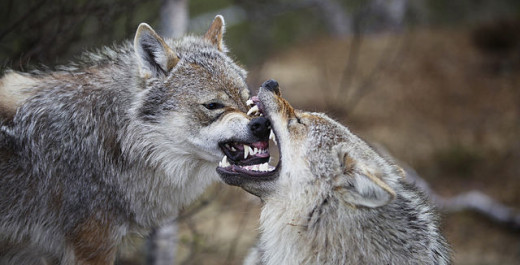23 Sep
- By Liliana Giovenco
- In Italian Language
- Comments None

Settembre sta finendo e molti di voi si sono rimessi sui libri perché è ricominciata la scuola, l’università o il vostro corso di Italiano!
Vogliamo farvi il nostro augurio all’italiana dicendovi: in bocca al lupo!
Avete mai sentito questa espressione?
Se in italiano vogliamo augurare “buona fortuna” a qualcuno è proprio così che diciamo.
September is almost over and lots of you have already come back to hit the books at school, at university or at your Italian course!
We would like to give you our italian wishes saying: in bocca al lupo! (litterally meaning “in the mouth of the wolf”)
Have you ever heard this expression?
This is an informal way in Italian to wish “good luck” to somebody.
Da dove deriva questo modo di dire? Non vi sono fonti certe al riguardo, ma la spiegazione più diffusa collega l’espressione al linguaggio della caccia.
Nella tradizione antica il lupo rappresentava un animale pericoloso e insaziabile di cui pastori, cacciatori e viaggiatori avevano molta paura, diventando anche il protagonista cattivo di favole e leggende non solo in Italia ma in tutta Europa.
Di questa visione negativa sono rimaste tracce attraverso i modi di dire e i proverbi. Ecco alcuni esempi di espressioni usate in inglese: “cry wolf “(gridare al lupo), “hold a wolf by the ears”(tenere il lupo per le orecchie), “keep the wolf from the door” (tenere il lupo lontano dalla porta, nel significato di “avere abbastanza denaro per sopravvivere”), “wolf in sheep’s clothing” (lupo in veste di agnello, per riferirsi ad una persona furba).
Altri modi di dire esistono anche in francese, tedesco e in italiano.
In Italia ad esempio diciamo “andare nella tana del lupo”, nel significato di finire nelle mani del nemico, “il lupo perde il pelo ma non il vizio” per indicare che è difficile eliminare le cattive abitudini, “avere una fame da lupi” quando siamo molto affamati.
What is the origin of this saying? We have no certain sources about that, but the more spread explanation is related to hunting language.
The ancient tradition saw the wolf as a dangerous and insatiable animal of which shepherds, hunters and travellers were very scared; it was also used as the villain in fairy tales and legends not only in Italy but all over Europe too.
This negative concept has left traces through proverbs and sayings. Some examples in English are: “cry wolf “, “hold a wolf by the ears”, “keep the wolf from the door”, “wolf in sheep’s clothing”.
Other sayings are also used in French, German and Italian.
In Italy we say for instance “to go into the wolf’s den” which means to fall into enemy’s hands, “the wolf loses its hair, but not its vice” to say that it is hard to get rid of bad habits, “to be hungry like wolves” meaning to be starving.
Ma parliamo adesso di “in bocca al lupo”.
In passato, per augurare buona caccia si diceva “in bocca al lupo”. Questo perché i cacciatori per catturare la preda dovevano avvicinarsi molto e quindi metaforicamente si mettevano nella bocca del lupo. Per allontanare il pericolo i cacciatori rispondevano all’augurio dicendo “Crepi il lupo”, dato che serviva molta fortuna e molto coraggio per affrontare l’animale.
Con il passare del tempo la gente ha iniziato ad utilizzare questa frase anche per augurare buona fortuna nelle situazioni difficili.
Se anche voi siete scaramantici, cioè se credete che alcuni gesti o oggetti possano allontanare la sfortuna, non rispondete a questo augurio dicendo “grazie” ma dite sempre “crepi”!
Let’s talk about “in bocca al lupo” now.
In the past, if you wanted to wish good hunting you had to say “in bocca al lupo”. Why? Because hunters had to get very close to the prey to catch it, so metaphorically they put themselves into the mouth of the wolf. To keep that danger away, hunters used to reply “may the wolf die”, in order to instill courage since they were about to face the animal.
Over the years, people started using this expression also to wish good luck to somebody for any hard situation.
If you don’t like to tempt fate, and believe in gestures or objects to ward off ill luck, never reply to this wish saying “grazie” but always say “crepi”!
Tags: italian sayings
Recent Posts
Archives
- April 2021
- February 2021
- November 2020
- February 2019
- November 2018
- August 2018
- May 2018
- March 2018
- February 2018
- January 2018
- December 2017
- November 2017
- October 2017
- August 2017
- July 2017
- June 2017
- April 2017
- March 2017
- February 2017
- January 2017
- December 2016
- October 2016
- August 2016
- July 2016
- June 2016
- May 2016
- April 2016
- March 2016
- February 2016
- January 2016
- December 2015
- November 2015
- October 2015
- September 2015
- August 2015
- July 2015
- January 2015


